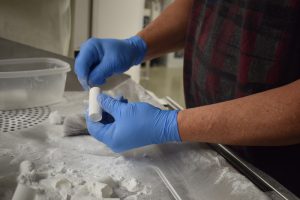July 22, 2020

A member of Monson’s team cleans a respirator connector valve for delivery to MU Health Care.
During the COVID-19 outbreak, we have become accustomed to washing our hands frequently, sanitizing surfaces we come in contact with and wearing face masks to prevent the spread of the virus. Still, as the virus continues to spread and the prospect for a vaccine is likely months away, going to the grocery store or simply touching a door handle in public can feel risky. While it is up to each of us to maintain good personal hygiene and practice social distancing, MU College of Engineering Director of Facilities Ron Monson and his team have found a solution to the issue of door handles.
Monson said as the virus began to spread in the U.S., Naka Endowed Professor Curt Davis tasked his team with coming up with a hands-free solution to door handles.
“Michael Absheer (the College’s Rapid Prototyping Lab Supervisor) found a design on the internet and then redesigned it,” Monson said. “There are ten different types of door handles out there, but this model has a little hook that comes up, which makes this special. It is universal and will fit on any door—round stock, square stock and any size—you just zip tie it to the door handle.”
Monson said the resin material used to 3D-print the door handles is washable and can be sanitized. His team printed ten door handles for the Center for Geospatial Intelligence (CGI) in Lafferre Hall, which is directed by Professor Davis.
“You place your arm on the flat part of the handle, then you are able to move the handle up or down and then push or pull against it, depending if the door swings in or out,” Monson said. “The CGI is a highly-secured area, so we’re going to put the door handles in there and we expect people will like these and want them for their own doors.”
A Critical Need for MU Health Care
Another COVID-19-related project Monson and his team recently completed started with a request from Pat Van Hunnik, the emergency management and safety coordinator for University of Missouri Health Care.
“They were having problems with these specific respirator connector valves due to issues with manufacturing,” Monson said. “Pat asked if we could design the valves from the originals they had on hand. They were single use connectors that were thrown away after each use.”
Monson described how his team developed the requested respirator connector valves. His team took the samples, reverse engineered them, and created a Soldiworks/CAD model of each. They then saved those designs as standard triangle language (STL) files and started to create the connectors in the Rapid Prototyping Lab. A medical-grade polymer was melted and used as the production material to create the connectors, and took about seven hours to complete one dozen connectors. Once the connectors were printed, they washed off the tiny bits of debris on each one and prepared them for delivery to Van Hunnik’s team.
“We produced 100 of each version—a two-way valve and a splitter, and donated them to MU Health Care,” Monson said. “The ones we made can be cleaned and reused, and I expect MU Health Care will request more.”
Monson received a note from Van Hunnik after the components were delivered.
“On behalf of myself, our respiratory therapy department and all of our incident command teams, I would like to thank you all for supporting us with making ventilator parts,” he wrote in an email to Monson. “Respiratory Therapy just informed me they thoroughly tested them and they work perfectly. In addition, they put some through their pasteurizer and found they can effectively be disinfected as well, which will help immensely. Again, we greatly appreciate your help and ingenuity in getting this done.”
Monson noted it took three weeks from design to delivery of the respirator connectors and just two weeks from design to delivery of the door handles.
“There were several challenges but my expert staff makes challenges easy,” he said.